In 2020, New Fangak saw its first primary school leaving exams since the war that started in 2013. A new project component strengthened the livelihoods of parents, enabling more girls from vulnerable families to join school.
Finn Church Aid (FCA) opened its office in New Fangak, Jonglei State in 2016 and began with an EU Humanitarian Aid (ECHO) funded project by constructing schools and attracting learners.
Currently, the support reaches 16 schools in Fangak County in four villages. Field Team Leader Dhuor Deng Kuony says that the idea of a child’s right to education has grown stronger during the past four years. New school structures, teacher training and involving the community have been vital.
“I’m personally proud when I see children coming to school and the support they get from their parents, the community and the government that runs the education affairs”, Deng says.
“The community has taken ownership of the schools. They have built the structures and parents are strongly involved in their children’s education through Parent-Teacher Associations.”
A total of 130 teachers has received training within the project, and more than 7,000 pupils can access learning spaces and materials. With awareness-campaigns included, the project has reached more than 20,000 direct beneficiaries and an estimated 60,000 indirect beneficiaries.
Supporting livelihoods of vulnerable families increase enrolment
When the initial project started in 2016, there were no schools. The education that took place was given under trees by teachers who barely had completed their primary education.
Teacher training has been an essential part of the project from the start. Qualified teachers equal quality education, and families become more motivated when they see their children not only attending school but actually learning.
Nyaluak Maker, 15, is in class 2 in William Chuol Primary School and says that teachers are now punctual, and listen and interact with learners. She describes them as friendly and motivating
“I now feel very comfortable with asking my teacher about things I did not understand during the lecture. They will come to me individually, and explain patiently until I understand”, she says.
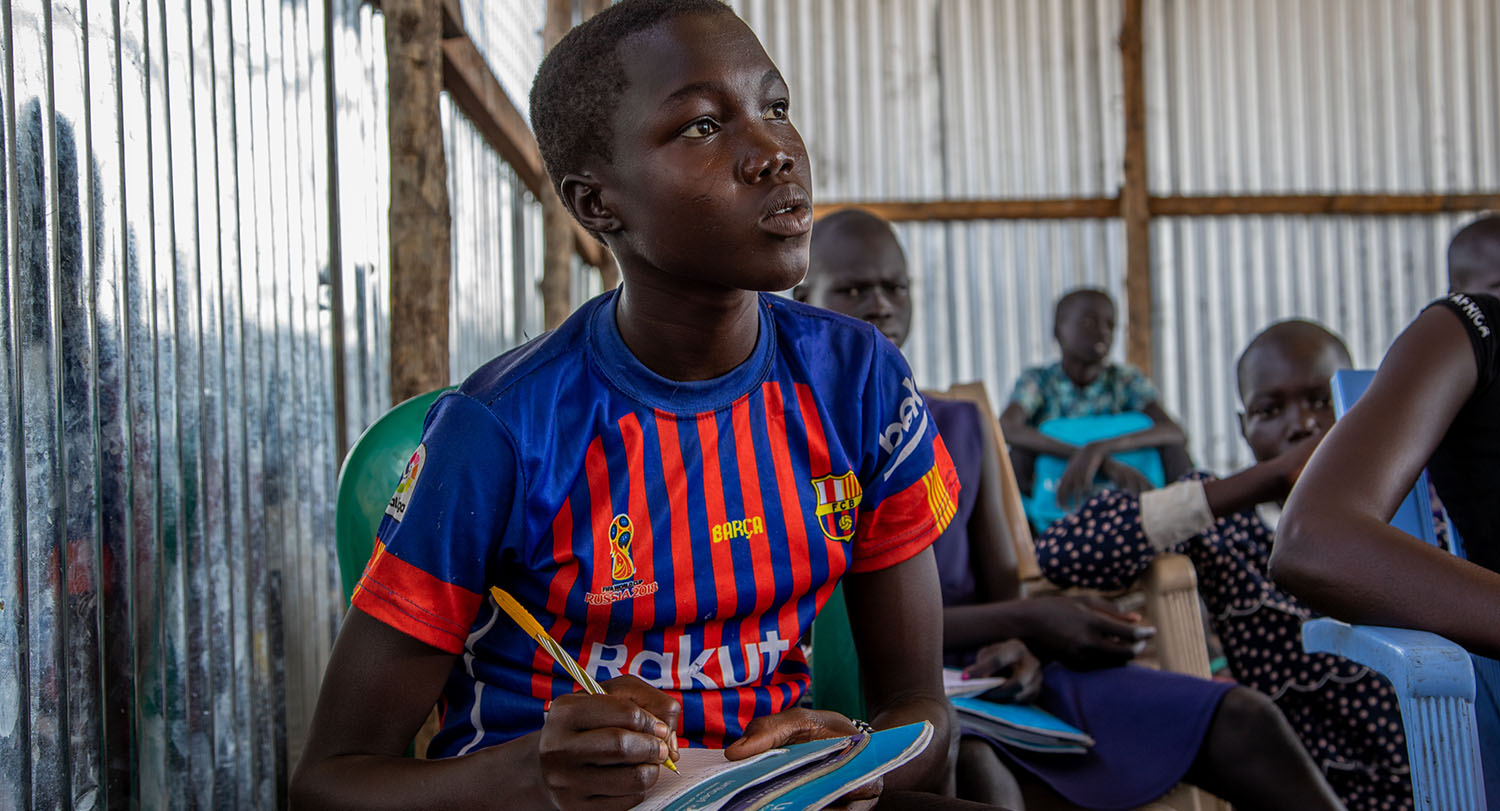
Nyaluak Maker, 15, says that her mother encourages her to focus on her learning. Photo: Maria de la Guardia / FCA
One of the challenges in Fangak County is convincing parents to send both boys and girls to school. In pastoralist communities, parents do not traditionally send their children to school, and particularly girls are the last to access education. They are often forced to marry at an early age.
“Women role models are powerful in convincing parents. We want to show that their girls can earn a living in the future, and for instance, female teachers are good examples”, Deng says.
But even more important is responding to the immediate needs of vulnerable families. In an area prone to floods and drought, food shortages are common, and poverty widespread. Many need their children to support the daily survival of their families through cooking or working.
This is why cash transfers and livelihoods support were added to the project, with funding by EU Humanitarian Aid. Parents that farm received seeds and training and the cash transfers have enabled single-parent households particularly to establish businesses at the market.
Nyadeng Chan and Wal Diew are both widows, and they combined their cash transfers of 6,050 South Sudanese Pounds (35 euros) each to establish a shop for tea and the local bread kisra.
“We decided to use the cash for something that keeps us going in the future instead of spending all on food. That would have soon taken us back to square one”, Wal says.
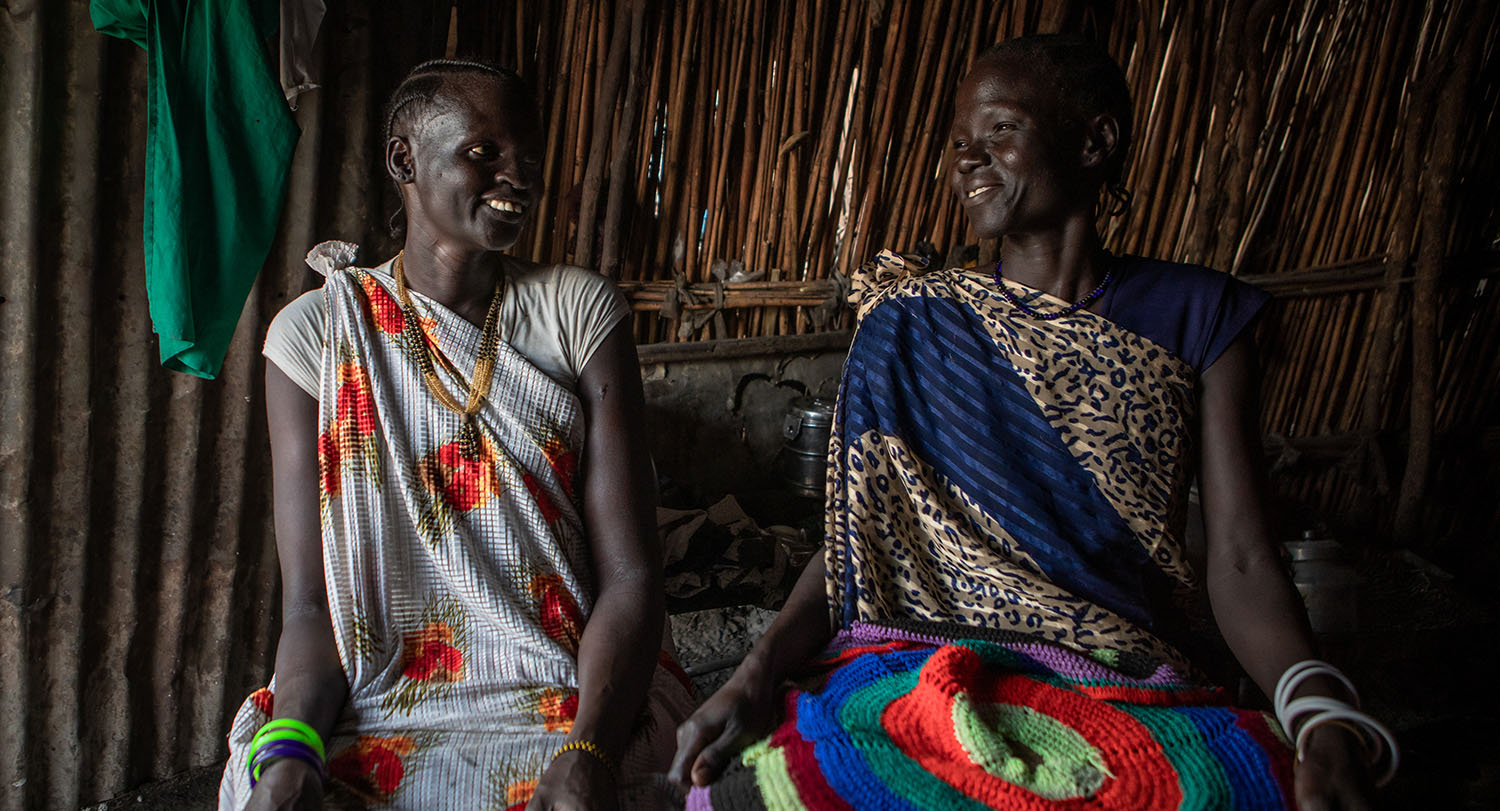
Business women Diew Wal and Nyaldeng Chan in front of the restaurant they co-own and run in New Fangak, South Sudan on 8 March 2020. Parents of school-going children receive cash distributions that help them start businesses to generate an income for their families. Photo: Maria de la Guardia / FCA
First primary leaving exams since 2013
The project reached a crucial milestone in early 2020 when 43 pupils sat, and 28 passed the first primary school leaving exams in New Fangak since the war started. This makes the youth eligible to continue their education journey on a national level.
17-year-old George Juang was one of the first to complete the exams in February.
“My teachers helped me prepare well. When I passed, many people I know are more eager to join the school because they also want to pass like me”, George says.
George now dreams of an opportunity to enrol in secondary education, which is not currently available in the whole of Fangak County. Despite a physical disability as a result of polio, he is determined to become an accountant.
“School teaches you to take care of yourself, and it exposes you to different cultures. You know how to protect yourself and how to pursue your dreams.”
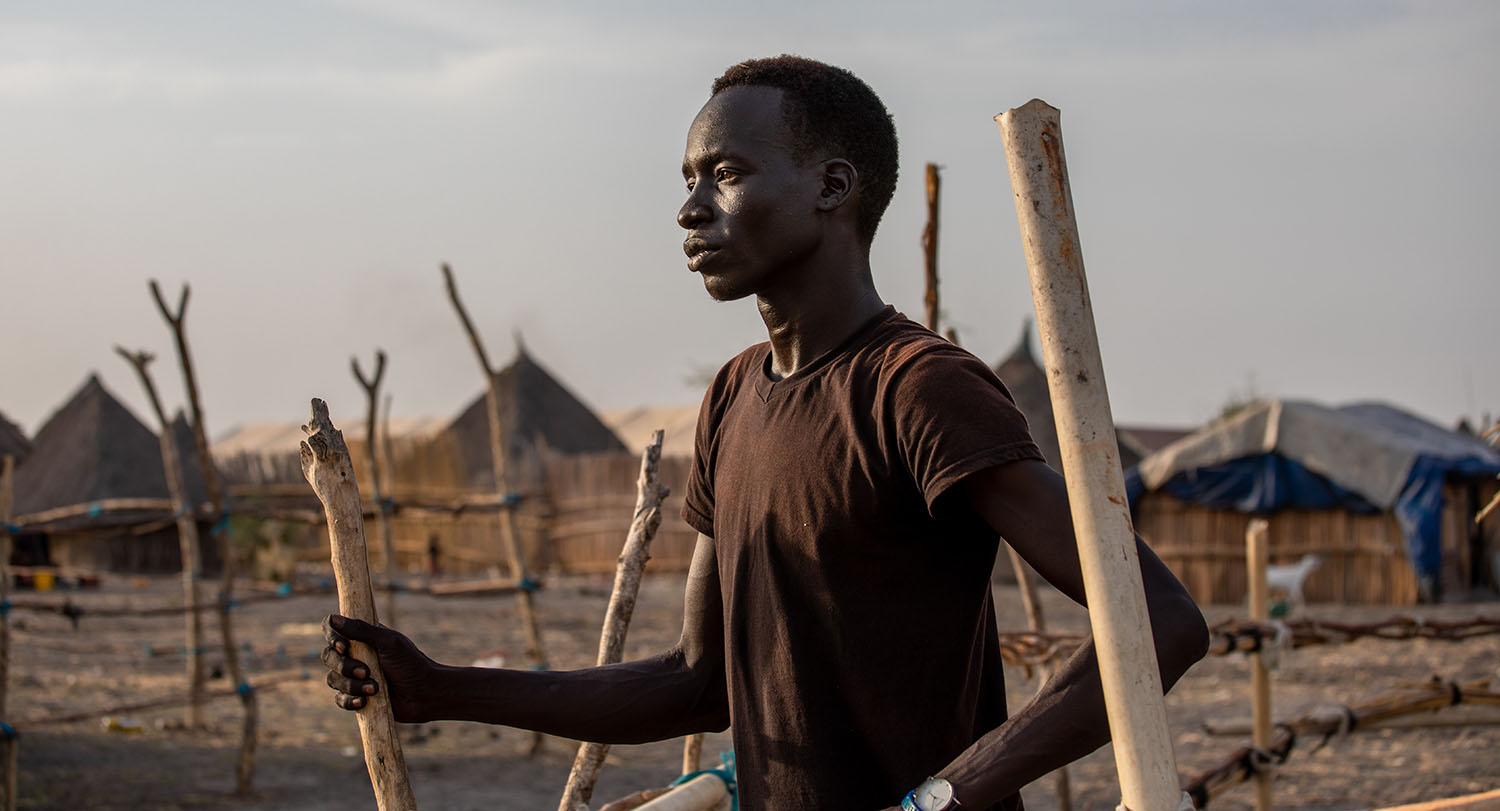
George Juang is one of the first in New Fangak to have sat and passed his Primary 8 exams. Photo: Maria de la Guardia / FCA
Read more about this project funded by EU Humanitarian Aid (ECHO) in our photo story.
Africa is one of the world’s fastest-growing markets, despite facing many challenges across the continent. Political ties of African countries, security issues and the effects of global phenomena, like climate change and the Covid-19 pandemic, have an increasing influence on the entire world.
This is why an increasing number of actors build partnerships with African countries. Last year, the US launched a new Africa strategy. Russia held its first Africa summit, and China has meticulously strengthened its ties with the continent. This year, the EU has worked on its own partnership strategy.
How should Finland position itself to play a part in Africa’s future?
FCA has released a document with recommendations for Finland’s Africa strategy. It emphasises that Africa is a continent of youth. They form the continent’s future and affect the entire world.
FCA argues that Finland can achieve its goal of having an impact beyond its size if its Africa strategy manages to harness the continent’s youth dividend for positive change and development.
While national populations in other parts of the world are ageing, most African countries have majority youth populations. Currently, 60% of Africa’s population is under the age of 25. These young women and men bring great potential for the African future. By 2050, there will be 2 billion Africans, and one-third of the world’s youth will be in sub-Saharan Africa.
Some of the most pressing needs in African countries coincide with areas where Finland stands out as a global leader, such as quality education, linking learning to earning, sustainable livelihoods and promoting peace, security, gender equality and good governance.
A mutually beneficial partnership is an opportunity for both Africa and Finland.
Learn more about the path forward from FCA’s recommendations to Finland’s Africa strategy. Download the document by clicking here.
Finn Church Aid (FCA) has granted 100,000 euros to prevent the spread of the coronavirus in South Sudan, Somalia and Uganda, in addition to 50,000 euros previously allocated to Kenya.
Vulnerable communities across the world are bracing for the impact of a potential spread of the coronavirus.
An essential part of slowing down the pandemic is maintaining sufficient hand hygiene and avoiding human contact but the measures are not easy to apply in for instance refugee contexts. Camps and settlements are densely populated, and people even lack access to soap.
Uganda hosts the largest number of refugees in Africa. FCA partners with the UN Refugee Agency UNHCR in the education sector and the work includes the two largest refugee settlements: Bidibidi in the north and Kyaka in the southwest of Uganda. They are home to over 250,000 refugees.
Uganda has closed schools across the country to prevent the spread of the coronavirus. By early April, Uganda had recorded 44 cases of the COVID-19 disease. The actual number might be higher.
FCA raises awareness on necessary hygiene practices and measures among school children, their families, and teachers. The information is shared through the radio, text messages and posters. FCA also distributes soap and other hygiene products to families and increases handwashing facilities. Within communities, mobilisers also share information through megaphones.
The work is financed with 50,000 euros from FCA’s disaster fund.
If schools remain closed, children from vulnerable families risk severe consequences. Many have access to clean water, food and emotional support only at school. They face a greater risk of violence, child labour, harassment, pregnancy and child marriage when they are out of school.
FCA’s Country Director Wycliffe Nsheka says that FCA also implements precautionary measures to allow schools to open safely when the time comes.
“We are adding handwashing facilities, disinfectants and maintaining facilities, and we prepare to train teaches in psychosocial support”, he says.
A lack of water and a fragile administration increase Somalia’s vulnerability
In Somalia, FCA starts awareness-raising initiatives in its six schools in Baidoa. The town hosts the second largest population of internally displaced people in Somalia. FCA granted 15,000 euros to the intervention.
Somalia had recorded five cases of COVID-19 by early April. The actual number might be higher.
Somalia has also closed all schools. FCA can reach around 3,200 school children and their families through school committees and teachers. Country Director Mika Jokivuori says that FCA arranges campaigns with the help of community mobilisers, distributes posters, gives guidance on hand hygiene and provides families with soap.
“The Baidoa area is particularly vulnerable because of a fragile administration, and a lack of healthcare and water. Schools cannot provide clean water to pupils on a daily basis”, Jokivuori adds.
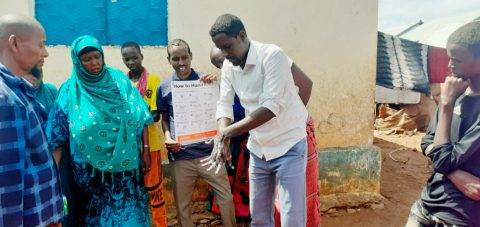
FCA’s community mobilisers demonstrate handwashing practices and other precautions in Baidoa, Somalia in March 2020. Photo: FCA
Children in the Baidoa area do not have smartphones and connections that allow distance learning. School closures thus further restrict the learning opportunities and well-being of children and youth that are already in a vulnerable position.
When schools reopen in Somalia, FCA will continue its awareness-raising by training teachers and pupils, establish school hygiene clubs and campaign for a safe return to school
Urgent need for precautionary measures in conflict-affected South Sudan
South Sudan’s government has also closed the country’s schools for at least a month, starting March 20th. The country has not recorded a single case of COVID-19 by early April, but the risks are high due to a fragile healthcare system and a challenging humanitarian situation.
Around 1,5 million people live internally displaced within South Sudan following years of conflict, and before the coronavirus pandemic, 7,5 million were already in need of humanitarian assistance. Malaria and diarrhoea are already common diseases, and a spread of the coronavirus would result in unprecedented consequences.
FCA has supported education for over 25,000 children and youth in Mingkaman, Fangak and Tonga, which are located in Lakes State, Jonglei State and Upper Nile State.
Although there are no recorded cases of COVID-19 in South Sudan at this point, there is a desperate need to have interventions in place, says FCA’s Country Director Berhanu Haile.
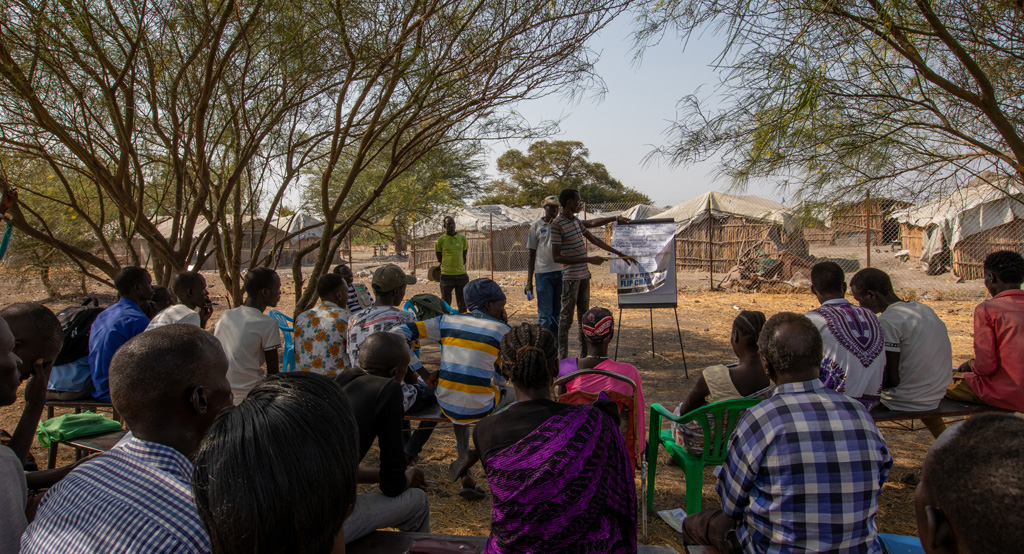
A group of volunteer teachers participated in FCA’s teacher training in New Fangak, South Sudan in March 2020. Now FCA begins to distribute information on the coronavirus and hygiene practices in schools through teachers. Photo: Maria de la Guardia / FCA.
South Sudan’s government is working with humanitarian aid agencies to support the fight against COVID-19 through awareness-raising and mass sensitization, including people living in internally displaced people camps.
“We must ensure that parents, children, teachers and the wider communities are sensitized and supported with essential lifesaving utilities like soap to prevent the spread of the looming pandemic if cases are recorded at a later stage. Prevention is better than cure”, Haile says.
FCA’s intervention reaches over 21,000 children, teachers and parents. Soap is distributed to 1,500 families. FCA’s disaster fund supports the actions with 35,000 euros.
Preparing for reconstruction after the corona crisis
The number of coronavirus cases and restrictions to contain the outbreak change quickly in different countries. FCA is prepared to modify and adapt its operations according to needs and circumstances, says Eija Alajarva, Head of Humanitarian Assistance.
FCA monitors developments in its countries of operation. Alajarva emphasises that despite the current chaos, we also have to look into the future.
“When the pandemic slows down and restrictions are removed, we have to support particularly children and youth returning to school”, she says.
Children and youth might need psychosocial support and remedial classes because their learning was disrupted
Entrepreneurs in developing countries also need support after the crisis. Movement restrictions threaten the income within the service sector, and the income of farmers usually depends on access to markets.
“Although our programme countries have yet the worst ahead of them, it is vital to prepare for reconstruction to ensure that there are no delays for it when the time comes”, Alajarva says.
Cash assistance allows families to decide for themselves what they need and when they need it.
Vegetables, fish, clothing, shoes. Bamboo sticks and hay for construction. In many parts of South Sudan, the selection of goods and food on the market is better than it has been in a long time.
The peace treaty has made deliveries easier, even to remote parts of the country. However, few people can afford to buy what they need. More than two million people have run from war within the country, leaving behind everything they had. On top of this, the inflation in South Sudan has raised the price of food sky-high.
In situations like this, aid organisations are increasingly resorting to cash assistance. For example, about 40 percent – a total of 990 million euros – out of the humanitarian aid given out by the European Commission, consists of cash assistance. The assistance is distributed either as cash or as coupons that can be spent on specific products.
”Cash is both more efficient and more cost-effective a way to support people in a humanitarian crisis,” says Finn Church Aid’s (FCA) humanitarian coordinator Moses Habib.
The conclusion is further supported by several studies that have been conducted on the topic. For example, the World Bank and the UN favour cash assistance during the post-crisis recovery phase.
Simply put, handing out cash ensures that a larger percentage of the assistance goes directly to those who need it.
For example, in South Sudan, food needs to be transported all the way from the capital Juba. The storage, transport and ensuring the safety of the transport alone cost a great deal, which decreases the amount of assistance reaching its final destination. The journey on the Nile or by road takes days, and robbers may attack the deliveries.
In South Sudan, FCA has handed out cash assistance in Juba, Old Fangkak, and Yei.
The money is particularly targeted to single mothers. The average family has 6 to 7 members. During FCA’s project, families receive a total of 100 to 150 euros in two to three installments. On the day of delivery, the head of the family arrives on the spot in person to be identified by using their fingerprint.
Cash distributions can prevent aid dependence
The decision to hand out assistance is preceded by a thorough needs assessment regarding how handing out cash will affect the market and the village communities. The village elders help in the assessment process by e.g. evaluating how the circumstances of individual families differ from one another and who has absolutely no safety nets in place.
There are also adverse consequences that are to be taken into consideration. These may include arguments among family members regarding how to spend the money, or an envious neighbour. Therefore, when handing out cash, the aim is to avoid situations in which out of two families living next to each other, one receives an assistance and the other does not.
Indeed, the biggest challenge is choosing who receives assistance. In Old Fangak, FCA has supported 1,000 families, but in reality, all 50,000 inhabitants have suffered from the war. Many families in need of assistance are left without.
Handing out a large amount of cash at once may even have a negative effect on the market. There is a risk of inflation or of merchants hearing of the assistance and then raising their prices.
To avoid situations like this, FCA follows-up carefully how the money is spent after delivery, in cooperation with local authorities. The observations have shown that more than half of the money is spent on food. Furthermore, parents are able to make the choice to feed their children with as much variety as possible.
A considerable number of internally displaced people spend their assistance on building a roof over their head. Moses Habib gives an example of a mother who lived in the yard of another family with her children and was mistreated by the other family. With the help of cash assistance, she was able to construct her very own clay hut for her family.
Cash distributions can also prevent aid dependence. Recipients of regular food assistance may not have the chance to help themselves and might get used to a situation in which they are the recipients of goods. With cash, they may plan their own lives themselves.
Many even save the money for future times of need. For example, farmers set aside money in order to survive a bad harvest. Some buy seeds for farming, or goats to get milk for their family.
It is important that the recipient of the cash is not bound by any conditions.
”For us, the most important thing is to allow people to prioritise their own needs instead of us giving them what we think they need,” says Habib.
Text: Erik Nyström
Translation: Leena Vuolteenaho
Illustration: Carla Ladau
Yei was South Sudan’s second biggest town before the civil war forced people out of the country in 2016. Three years later, conditions in Uganda’s refugee settlements and a hope of peace push people to return.
Finn Church Aid’s (FCA) operations in South Sudan expand into the country’s war-torn Equatoria region. Yei town is the main centre of Yei River County, which was heavily affected by fighting since 2016.
Yei used to be an important trading point and the main food supply for the capital Juba as well as other parts of the country, says FCA’s Livelihoods Officer David Oliver Taban, who heads the new field office.
The civil war forced people to abandon their homes and leave their farms to wither. However, this year has seen a stable improvement in the security situation and many have returned to assess the situation.
“They find that all their property is destroyed or looted, and they need support for rebuilding their lives when they decide to stay”, Taban says.
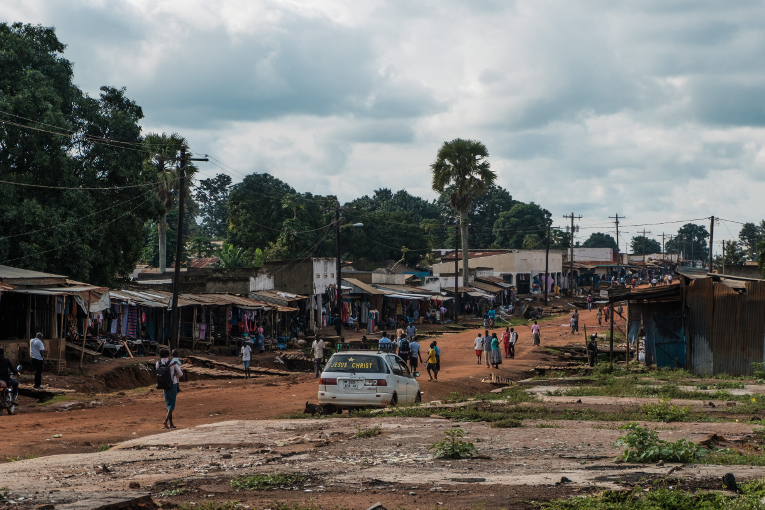
The inhabitants of Yei abandoned their hometown almost completely when fighting spread to the county in the summer of 2016. Most sought refuge in neighbouring countries.
Situation still unpredictable, repatriation a private decision
A careful optimism after the peace deal signed in September 2018 attracts many returnees. On the other hand, many feel that they do not have a choice due to a severely underfunded humanitarian response in Uganda. The returnees mention cuts in food rations and lack of opportunities for secondary education.
“These are people who used to farm vast swathes of land and feed the entire country. The land given for cultivation in Uganda is very limited, and other job opportunities are scarce”, Taban says.
Yei’s town centre has seen a stable increase in business. Maize and vegetables are widely cultivated, and the government says the roads are safe for transporting goods from an increasing number of locations, including Juba.
Farming is however still limited to the immediate proximity of the town. Armed groups who did not sign the peace deal are still at large in the surrounding villages, and violent incidents and robberies are still reported. UNHCR does not deem repatriation from Uganda safe because of these risks.
FCA’s Humanitarian Coordinator Moses Habib calls the security situation unpredictable.
“The return to Yei is a private decision, but as FCA, we need to be where the humanitarian needs are. We expect people to start returning in greater numbers by the end of the year”, Habib says.
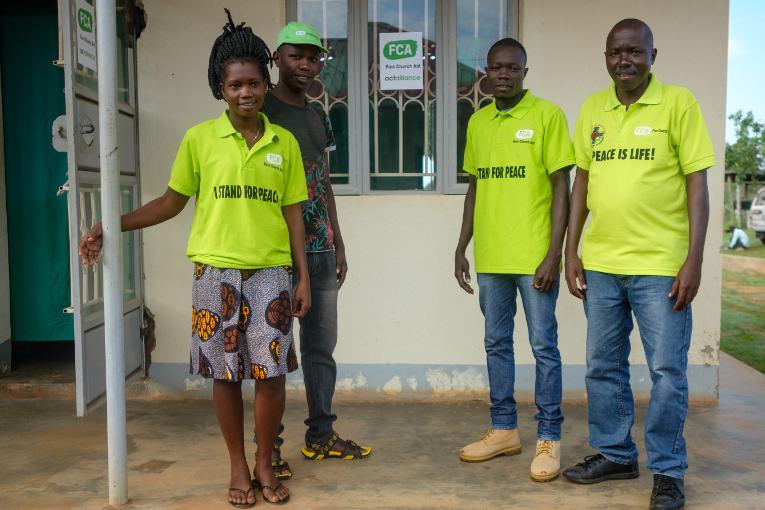
FCA’s new field office in Yei starts with four staff members.
FCA’s operations expected to expand rapidly
FCA started its first project in Yei in 2017, when 1,620 families received cash support funded by the Finnish Ministry for Foreign Affairs. The beneficiaries bought food from the market and maintained businesses.
A new phase of cash distribution starts in August with funding from the Icelandic Church Aid, targeting a thousand families. This support can help families resettle, invest in businesses and cultivate. FCA selects the most vulnerable families carefully in a process that targets primarily women-headed households.
“The support is unconditional, which allows returnees to address their most pressing needs, which usually involve feeding their families, rebuilding their houses, cultivating and starting businesses”, Habib says.
“We expect to expand our operations rapidly into other areas, like livelihoods and peace building. The community needs reconciliation after a conflict that has pitted many against each other.”
Photos: Sumy Sadurni
The region of al-Sudd in South Sudan is one of the biggest swamps in the world. The region has offered a refuge for people escaping the war. During the hardest times of the war, people waded through wetlands, risking running into crocodiles and snakes, and ate water lily fruits to stay alive.
OLD FANGAK, SOUTH SUDAN. The little mango trees sprouting promising shoots in Samuel Gony Gori’s pots are a veritable miracle, considering the cracking soil surrounding the 50-year-old farmer’s land, and the unbearable, nearly 40-Celsius heat in Old Fangak in the daytime.
Samuel waters his plants with water from nearby Zeraf River. Working the foot-operated water pump may be hard work, but it keeps his hope of a successful crop alive. The mangoes require care, and without the water pump, farming would be impossible during the dry season.
“In the harvest seasons, I sell a lot of produce at the market, and with my savings, my family can enjoy two good meals a day. My income is even enough to pay for the children’s clothing.”
Fangak is located in the north, near the border with Sudan. The peace negotiated last autumn is a reality here, but the soil is unrelenting and farming is hard. In the south of the country, the region of Equatoria – located on the Equator – is known as the breadbasket of South Sudan, and a saying originating from there goes, “If you throw a seed in the ground, it grows into a giant mango tree.” Nevertheless, farmers have left Equatoria because of the fighting still going on in the region.
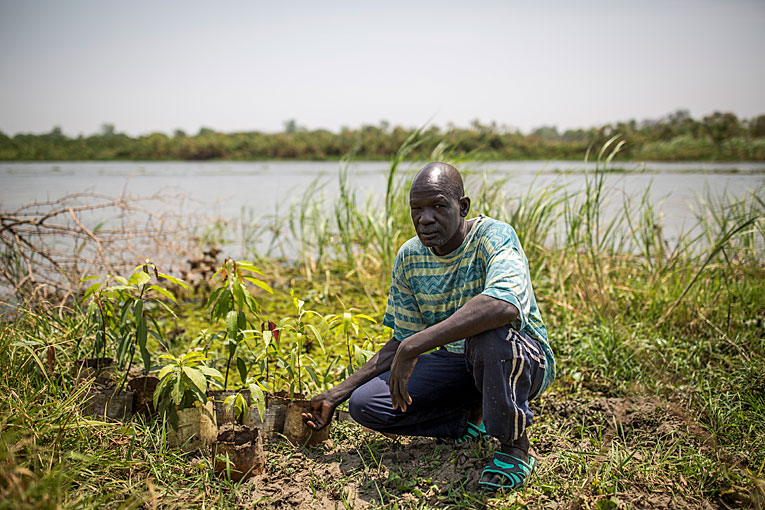
Samuel Gony Gory grows mango trees.
Samuel radiates the confidence of a person who has overcome the worst. His family witnessed the painful turns of the South Sudanese civil war. Two years ago, they were in the middle of a famine caused by the fighting in the small town of Bentiu in neighbouring Unity State.
“There was absolutely nothing to eat. First I stopped farming because of the constant gunfire. Then our relatives started to disappear, and we decided to seek shelter here,” recalls Samuel.
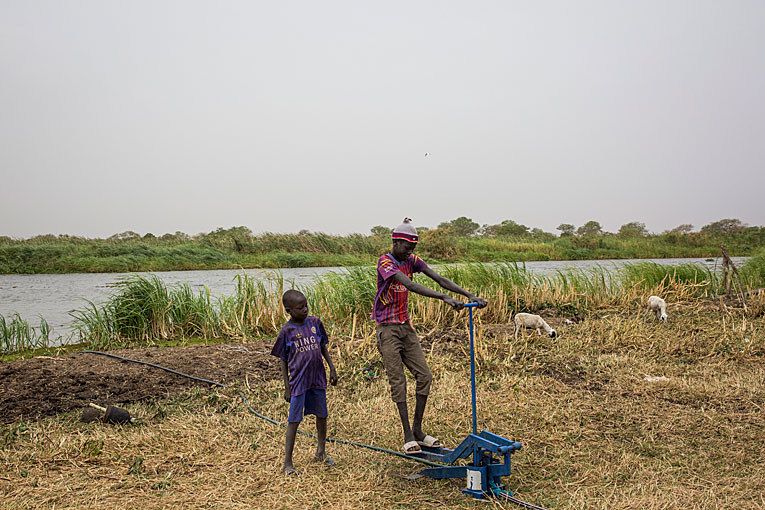
The water pump has caught the interest of the youngest in the village.
The swamp region of al-Sudd is one of the biggest in the world. The name is Arabic and means “barrier.” The swamp is so difficult to cross that back in the days when explorers were searching for the source of the White Nile, they got stuck in the wetlands of al-Sudd.
Old Fangak is a former British garrison town whose old buildings were destroyed in the civil war. The population mostly consists of Nuer people, the archrivals of the Dinka people represented by President Salva Kiir.
During the civil war, Old Fangak became a haven for refugees. While in 2013, the population was 5,000, last year the number was up to almost 50,000.
The soldiers did not think it was worth the trouble to brave the swamp, the inner parts of which can only be reached by boat via Zeraf River, an arm of the White Nile, or by plane – that is, unless you are running for your life. Families seeking shelter from fighting and famine have escaped soldiers by treading through the swamp despite crocodiles and poisonous snakes.
In the deepest parts of the swamp, adults carried children on their shoulders.
“The worst part of the journey was hunger,” says Samuel. His family survived the journey that took a month by eating the fruits of water lilies.
“It’s hard to say whether it was hunger or bullets that killed them.”
“Many people who fled at the same time as we did had been starving for so long that their strength had ran out. We were forced to leave people behind as the soldiers found us time after time,” recalls Samuel.
“It’s hard to say whether it was hunger or bullets that killed them.”
In June 2017, the UN declared that the famine was over, but since then, the situation has only gotten worse.
In February 2019, the UN estimated that over six million people live in acute food shortage. That is more than half of the South Sudanese population. About 1.5 million are on the brink of famine.
“Peace is a prerequisite for any improvement in the situation,” says Moses Habib, humanitarian coordinator for FCA. The peace deal has raised optimism, but the people who left their homes are still too afraid to return.
At the same time, international aid is decreasing at an alarming rate.
“Initiating self-sufficient food production takes time. Food aid is still vital so that people have the energy to think further ahead than until the meal for the next day,” says Habib.
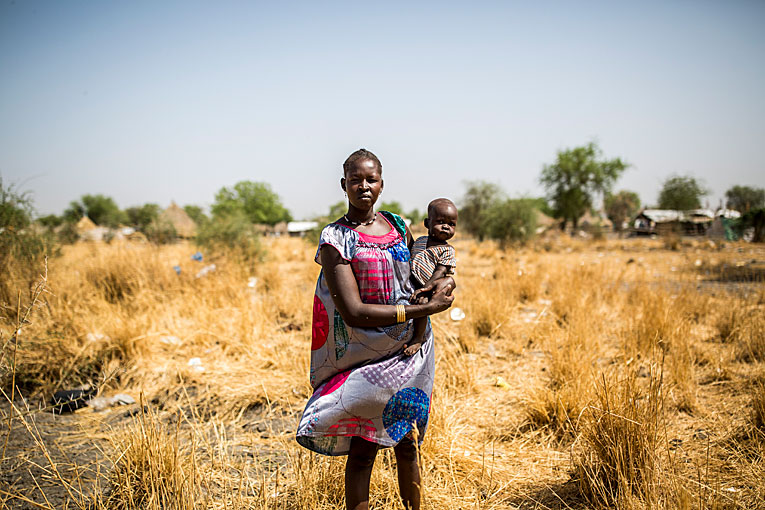
Nyarom Jiech Chuol is a single mother with seven children.
In the midmorning, the Zeraf River’s boat traffic flows towards the market in downtown Old Fangak.
Canoes are carved from coconut tree trunks. The precious fish are shielded from the sun with grass. Fish is cheaper than meat, and the catch does not always reach the market before being sold.
Mother of seven, Nyarom Jiech Chuol, buys a bunch of tilapia at the market for about two euros.
“I provide for my children by collecting firewood and I sleep through the night in peace, without gunfire,” says Nyarom. She ran from the fighting in Bentium that led to famine.
FCA has assisted 1,000 farmers and 500 fishermen in the Old Fangak area by providing seeds, water pumps, nets, hooks, and education. In addition, 1,000 families have received cash assistance.
FCA also supports 30 schools in Fangak, with over 16,000 pupils.
The huts made out of waterproof tarpaulins and bamboo represent the population of the region. Many internally displaced persons use the tarpaulins given out by aid organisations, while the locals have roofs made of grass or tin.
The repercussions of the war can be seen at the market. In wait of the next crop, the selection of vegetables on offer is nonexistent. Onions cost half a euro a piece. Before the war, one euro was enough to feed a family for a day, now the prices are tenfold. Food production is insufficient, inflation is out of control, and imported food is expensive.
Nyarom has received cash assistance from FCA in every three months. The assistance of about 50 euros brings variety to her children’s diet. Nyarom says that she saw with her own eyes where the food shortage began.
“It started when we had to leave our cultivations and our livestock. Both cattle and people were burned alive in their clay huts,” she says.
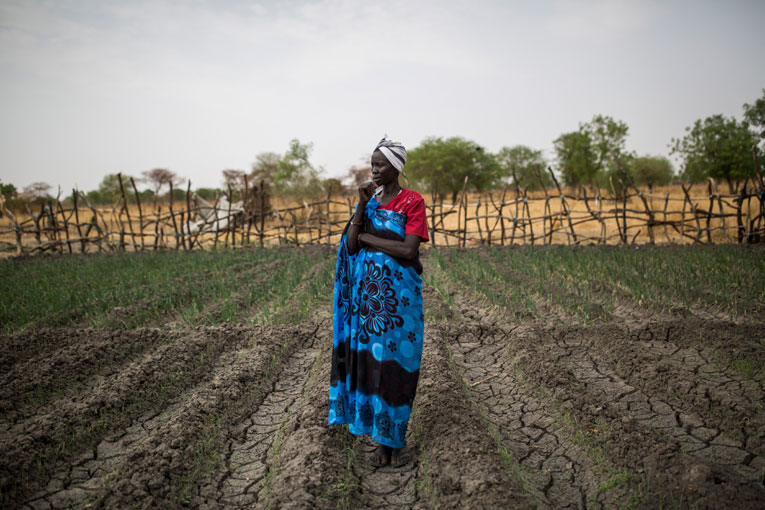
Elizabeth Gal is a dedicated farmer.
Because of how isolated it is, Old Fangak depends on the goods delivered from capital Juba via the Nile. Before the peace deal in September, the goods often did not make it past the checkpoints along the way.
Now, the route is easier to travel. However, there is still too little food because of the fighting still going on in Equatoria.
According to Habib, improving the situation in Equatoria is crucial. At present, over one million people have fled the region and crossed the border to Uganda, and the parties who did not sign the peace deal continue to fight.
“Without peace, people won’t return to their crops, and without food, there is no steady foundation for peace,” says Habib.
Nevertheless, the Nile deliveries have provided farmers with more seeds and tools. Next to Samuel’s crops, 43-year-old Elizabeth Gal waits for a new hose for her water pump.
The furrows in her plot of land are as straight as a pin, but the field is completely dry and cracked because the hose is too short to reach the field from the river.
“As long as I have the seeds and tools, I can do anything,” she assures us.
Translation: Leena Vuolteenaho
Text: Erik Nyström
Photos: Patrick Meinhardt
Pibor was long known as the Wild West of South Sudan because of cattle rustling and age-set fighting. The effects of peace processes supported by FCA have enabled the town’s market to flourish and opened the people’s eyes to livelihood opportunities.
The rays of the evening sun caress the town of Pibor and inhabitants are washing themselves by the river at the end of a hot day. FCA’s finance administrator Moses Ludoru greets passers-by on his evening walk. His easy laughter is contagious.
Ludoru is a familiar sight to locals, as his evening walk has become routine during peacetime.
”I want to stretch my legs and see what people are doing. There is so much new development here,” Ludoru describes.
Women are digging the soil together. More and more are planting vegetables. Pibor’s marketplace is buzzing with people buying food and other items from the sheet metal shacks and clay huts. At a youth club, children are playing a football game on the television.
”Before, nothing was grown here, and we brought our food all the way from Juba. Now we can buy our food here,” Ludoru explains.
Young people fight each other for influence
Pibor is the main town of Boma State, nearly 400 kilometres east of the capital Juba. Boma used to be part of Jonglei State that has long been among the most restless regions in South Sudan.
Ludoru’s work began quite literally with an empty desk. Armed men had cleaned out the previous office premises down to the chairs and desks when he settled in Pibor in early 2016. Organisations had evacuated their employees.
The conflict was a sum of many parts, like poverty, food shortage, prevalence of guns, and struggle for power. When Ludoru arrived, the fighting was between the opponents and supporters of the governor at the time.
“Before FCA started building reconciliation, people in conflict were more likely to reach for a gun than to engage in dialogue,” says Ludoru.
Pibor is home to the Murle people, characterised by a hierarchy based on age-sets. Boys are born into a specific age-set distinguishable by name, colour and scar patterns traditionally made on the skin. One generation has an age span of 10 to 15 years.
Traditionally, there comes a time for each generation to become decision-makers for their people, but since the war, the traditional rhythm has been compromised.
”Young people who have fought in wars at a young age want to have more influence and they might use violence to achieve it,” says Ludoru.
Cattle rustling fuelled the violence
We stop at a tea room at a sheet metal shack serving strong-flavoured ginger tea. A group of around 20-year-olds stand near the building. Their leader, Bollein Daki, has a bullet wound in his elbow.
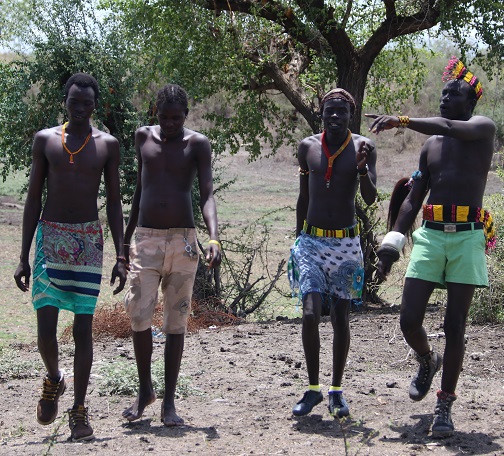
Simon Ngago (on the left), Allan Mau, John Kikir and James Golla are part of the Lango age-set. For them, peace means the freedom to move without fear, and that children can go to school without worrying. Photo: Liselott Lindström
Daki represents the Kurenen age-set, or youngsters around 15 to 25 years of age. The Kurenen separated from the slightly older Lango age-set. Before that, the Lango had separated from the Bothonia age-set. The rifts among the youth have been deep.
Bloody fighting ensued, forcing the Kurenen to retreat out of town. If Daki and his friends had shown their faces at the marketplace back then, the result would have been at least a fight.
”The fighting made farming impossible, and innocent people lost their property”, says Daki.
The conflicts usually start with cattle rustling. Raising cattle is the main form of subsistence in the area, and the number of cattle is a symbol of status. Young adults need cattle in order to marry and start a family.
The dowry sets a man back at least 50 cows. In a poor region, many decide to steal what they need, and the food shortage has also encouraged looting.
Previously fights were resolved using sticks as weapons, but the war increased the number of firearms in the region. “The consequences were ugly”, says James Golla from the Lango age-set. The fights could grow to involve thousands of people.
”We even lost parents in the crossfire, as our mothers and fathers tried to stop the fighting,” Golla reminisces. ”The violence stopped food transports, and everybody suffered.”
Livelihoods strengthen peace
Daki and Golla reconciled the disputes between their age-sets in a peace process last year. The reconciliation was inspired by the FCA-supported peace between the tribes of Boma State and the peace between Boma and the neighbouring Jonglei State.
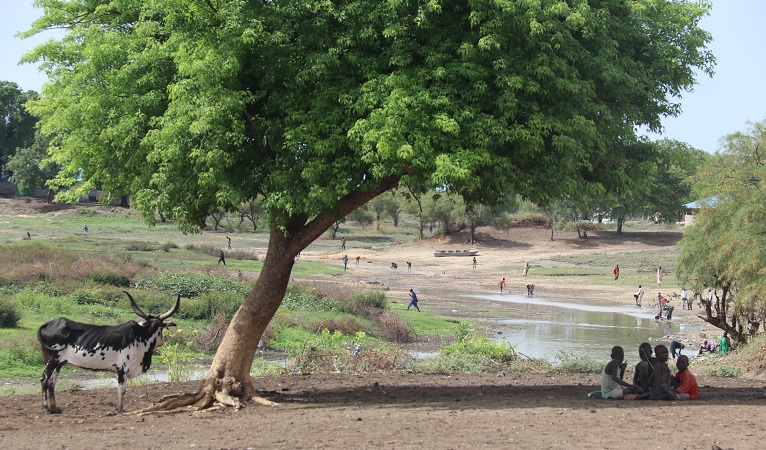
The banks of the Pibor river are busy in the late afternoon. Photo: Liselott Lindström
In late 2016, FCA gathered the Murle of Boma and the Dinka of Jonglei for a peace meeting for the first time. The tribes reached a historic agreement on peaceful coexistence. The people of Boma State were granted permission to use the route to the capital Juba through Jonglei, making movement and trade easier.
40 leaders in key positions took part in the process between the states, and over 90 percent of those involved reported being satisfied with the results.
Boma State has about 200,000 inhabitants. Last year, FCA gathered the Murle leaders of the state to reconcile their differences on political appointments in the state leadership. Traditionally, the disputes have led to fights for which the parties involved have recruited young age-sets.
The strength of the peace was put to the test when a new governor took office again at the turn of the year – this time, under historically peaceful circumstances. For the first time in years, Boma State was spared any major violence.
”At first, I hated meeting the Lango, but now we are able to enjoy a meal together”, says Daki.
Peace would not be possible without increased livelihood and education opportunities, says FCA’s peace officer Stephen Drichi. Now, people are able to pursue their goals without fighting.
The age-sets have come together to learn skills such as fishing, baking and cooking. Now people from Pibor can find for instance fresh fish at the marketplace, in addition to dry food.
”We have also organised football tournaments for young people, with different age-sets playing together in mixed teams,” says Drichi.
An increasing number of children go to school
Before FCA arrived in Pibor, there were virtually no school buildings in the area, and education was not appreciated. The men made a name for themselves by fighting, and the women married underaged.
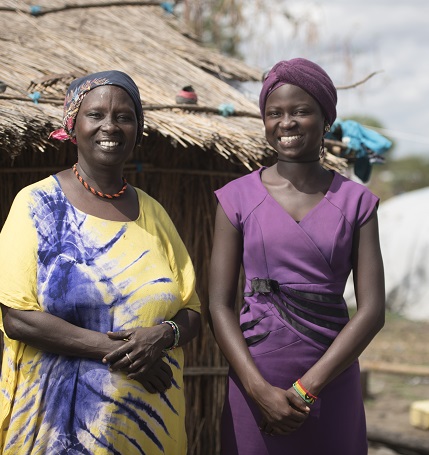
Work with education has opened the eyes of the Pibor townspeople to the significance of education, even for girls. Hellen Ajar (on the left) says that school is making her daughter Susan more independent and is giving her better opportunities to support the entire community. Photo: Hugh Rutherford
FCA has built several temporary learning spaces in the Greater Pibor area, and last May, five larger school structures were completed. In addition, FCA has trained 60 volunteer teachers.
The education project has reached over 4 000 children. The parents participate in the maintenance of the schools.
The improvement in education has encouraged parents to also send their daughters to school, in addition to boys.
Hellen Ajar sells tea at the Pibor marketplace and says that the youngest child of the family, Susan, 15, is allowed to continue with her studies all the way to university.
According to her, girls used to be brought up just in the hopes of cattle.
”Susan’s sisters married young, just like I did at 14. There have been men asking about Susan, but I have told them no,” says Ajar.
Education also strengthens peace. It increases the opportunities for work for children and youth and affects the survival of their families and communities. Young people are also offered peace education, providing them with tools for reconciliation and dialogue. In the reconciliation meetings themselves, the tools are a practical asset.
According to Drichi, conflicts that arise can be dealt with quickly.
”The next step is to prevent all dangerous situations, but that requires long-term work,” he says.
”The longer an individual person sees peace, the harder that person will work to maintain it.”
Text: Erik Nyström
Photos: Hugh Rutherford and Liselott Lindström
Finn Church Aid (FCA) handed over twelve classrooms to the government authorities in the Greater Pibor area in late May. FCA ensures quality education through training teachers and involving parents.
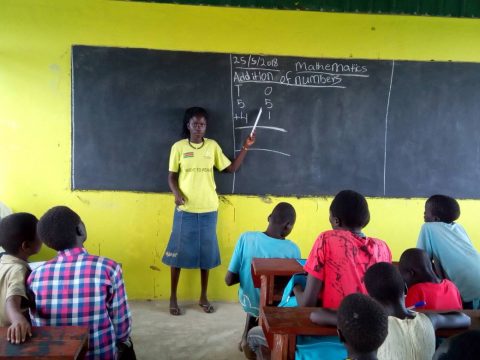
Stella Boyoi teaches mathematics to children in the newly built classroom. Photo: Kajasuk Jackson
Finn Church Aid and local authorities completed a mayor achievement in the education of children in the Greater Pibor Area with the handover of five classroom blocks, consisting of twelve classrooms.
The project’s aim was to improve access to quality education in most remote communities in Pibor and Gumuruk, locations that were marginalised and neglected for long due to conflict.
In addition to the classrooms, FCA trained 88 members in Parent-Teacher Associations to support school functions, 10 county education staff in management and 60 volunteer teachers in pedagogy and psychosocial support. Thanks to public awareness campaigns, the project reached 4 106 children.
Stella Boyoi is one of the newly recruited volunteer teachers in Langachod Primary School. According to Boyoi, there were no good school structures in Pibor in the past.
Parents are now encouraged to send their children back to school after a long period of instability.
“Before, children were learning under trees and ran home whenever it started raining”, she says.
Safe and inclusive education for girls and boys
Boyoi believes that the brand new classrooms themselves, with benches and desks, attract children to participate in lessons and help them stay attentive throughout the school days. FCA has provided exercise books, chalks and chalkboards, as well as incentives for the volunteer teachers to ensure quality education.
Parent-Teacher Associations play an important part in managing the schools. The members received agricultural tools, seeds and trainings to generate income and thus support the schools financially.
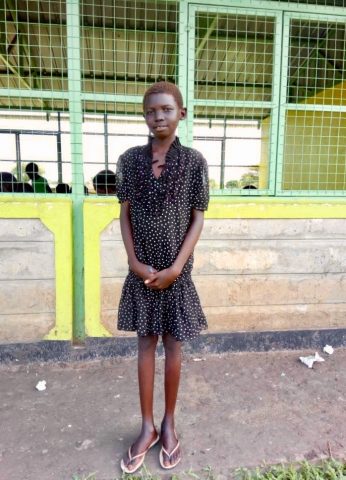
Mary Paul, 11, says she feels safe in the new school block in Langachod. Photo: Kajasuk Jackson
Boyoi hopes that families also send their daughters to school. In the local culture, it has been common that parents expect girls to do domestic work and marry at an early age.
Attitudes are slowly changing with improved access to education and the opportunities it brings for the future of the children.
“I decided to become a teacher because I want to change our community through education. As a woman, I also want to be a role model for all the young girls”, Boyoi says.
11-year-old Mary Paul is the second youngest of four sisters. Her eldest sister did not go to school, but Mary now has an opportunity to participate because the new structures are close to her home.
“I joined school because it is now near to my home, and I don’t have to fear to come to school alone”, she says.
Text: Kajasuk Jackson, Erik Nyström
Read more about Finn Church Aid’s work in South Sudan here.















